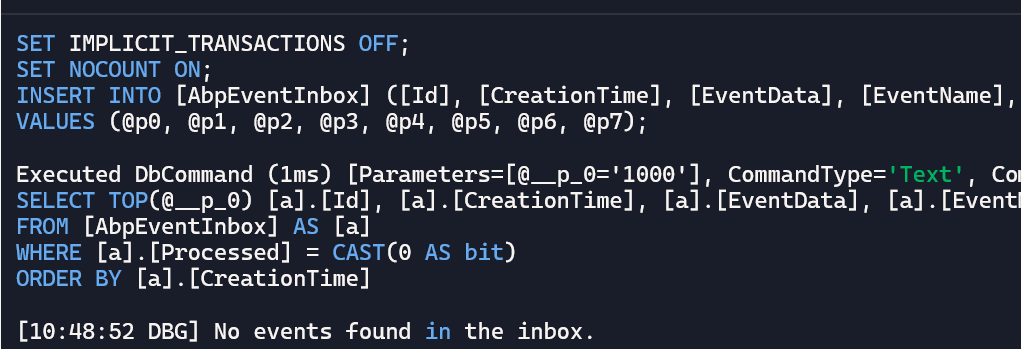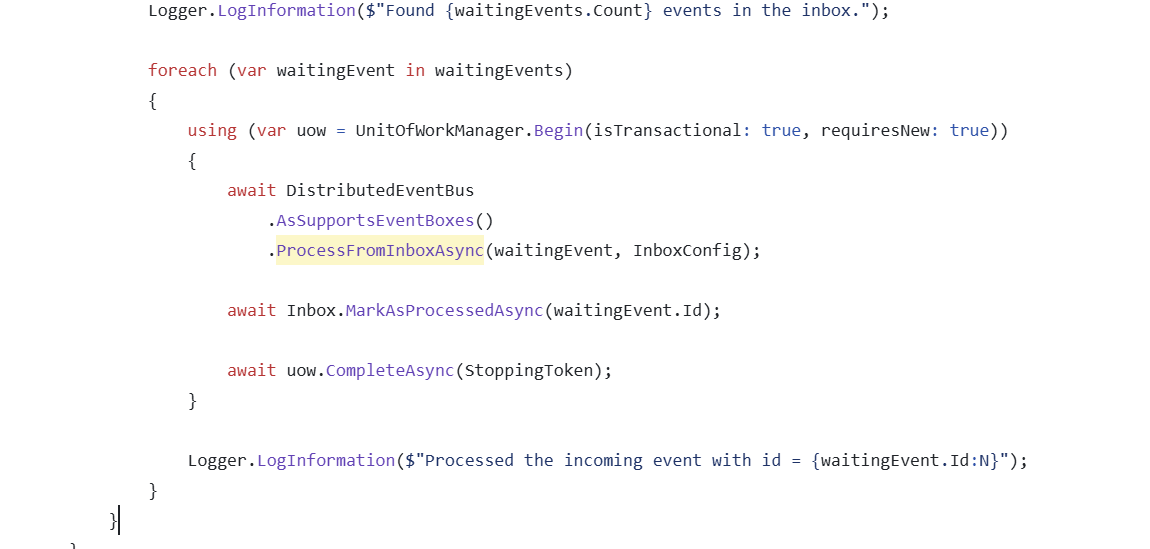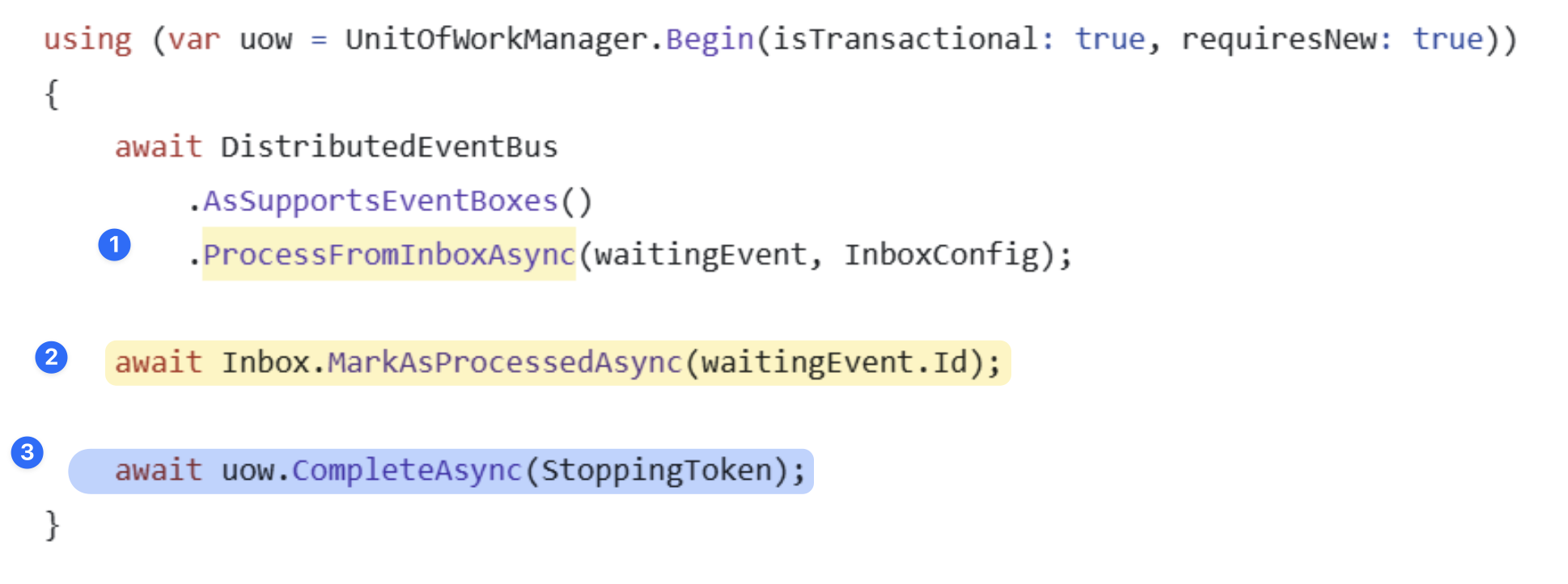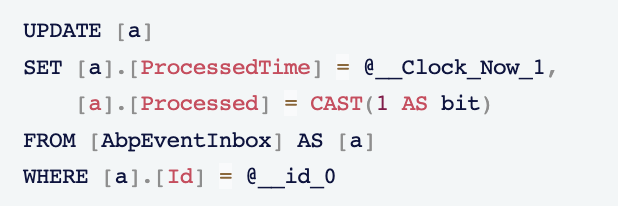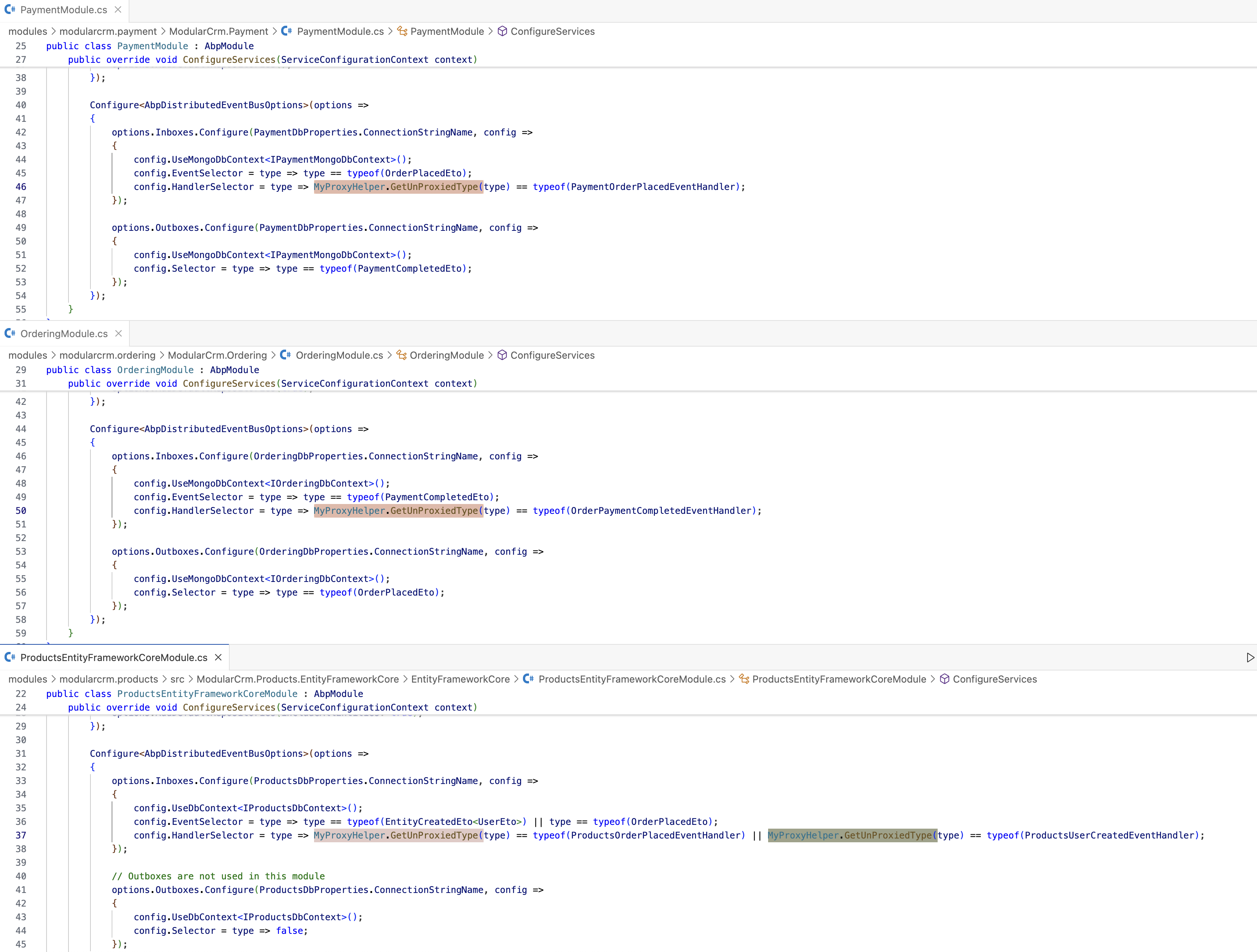We're currently implementing the Inbox pattern in our microservice architecture and have run into an issue with the Processed flag in the AbpEventInbox table. When an event is received, our service performs two operations:
- Synchronizes data to a SQL Server database
- Stores event details in MongoDB We have two DbContexts within the same microservice, with the AbpEventInbox table configured in the SQL Server context
The problem is that the Processed flag is being set to true even when an exception is thrown during event handling. This results in the event being marked as processed, despite not being successfully handled.
We attempted to override the InboxProcessor and invoke MarkAsProcessedAsync only when no exception occurs. However, we noticed another issue: sometimes the Processed flag is still being set to true even though the event handler was never invoked.
Here’s a snippet from our logs:
[10:48:52 DBG] No events found in the inbox.
The insert statement is logged, but the subsequent select query doesn’t return any events, even though the Processed flag was explicitly set to false. The event is set to processed somehow without being logged.
We want to ensure that:
- Events are only marked as processed if they are successfully handled.
- Failed events due to exceptions are retried.
Could you guide us on how to reliably prevent premature flagging and ensure retry logic works as expected?
18 Answer(s)
-
0
To ensure the Inbox pattern works reliably in your ABP microservice architecture, consider the following:
- The ABP Inbox pattern is designed to mark events as processed only after successful handling. If the Processed flag is set to true even when exceptions occur, this typically indicates that the event handler's transaction scope or error handling is not correctly configured.
- When using multiple DbContexts (SQL Server for AbpEventInbox and MongoDB for other data), you must ensure that the event processing and the update of the Processed flag are part of the same transaction in the SQL Server context. If you perform operations in MongoDB and an exception occurs there, but the SQL Server transaction is already committed, the event may be marked as processed prematurely.
- Overriding the InboxProcessor and manually calling MarkAsProcessedAsync is not recommended unless you fully control the transaction boundaries and error propagation.
Recommendations:
Ensure that your event handler logic is wrapped in a transaction that includes both the SQL Server and MongoDB operations (if possible). If not, handle failures in MongoDB by throwing exceptions before the SQL Server transaction commits.
The ABP Inbox processor should only mark events as processed after the handler completes without exceptions. If you see the Processed flag set without handler invocation, check for:
- Multiple processors or background jobs running in parallel.
- Manual or custom code that might be updating the Processed flag.
- Issues with transaction isolation or context misconfiguration.
Review your configuration to ensure the Inbox is set up on the correct DbContext and that only one processor is polling the inbox table.
For reliable retry logic, do not catch and suppress exceptions in your event handler. Let them bubble up so the ABP infrastructure can retry the event.
Example Configuration:
Configure<AbpDistributedEventBusOptions>(options => { options.Inboxes.Configure(config => { config.UseDbContext<YourSqlServerDbContext>(); // Optionally, set polling interval, batch size, etc. }); });References:
If you follow these guidelines and ensure that exceptions are not suppressed, the ABP Inbox pattern will only mark events as processed after successful handling, and failed events will be retried as expected.
This response was generated by AI. If it didn’t solve your problem, feel free to post a new answer — our support team will jump in to help you soon.
-
0
-
0
hi
The problem is that the Processed flag is being set to true even when an exception is thrown during event handling. This results in the event being marked as processed, despite not being successfully handled.
Can you share your event handler code?
Thanks
-
0
Hi,
Please find below the event handler code. _repository stores data to SQL Server Db. _eventHistoryRepository stores data to mongo db.
-
0
hi
Which line will throw the exception?
Thanks.
-
0
Hi, We have events coming from different microservices. So, if the events are not received in the correct order, it throws foreign key exception when inserting to db. await _repository.InsertAsync(appLicence);
-
0
hi
Can you try to save the current unit of work?
await _repository.InsertAsync(appLicence, true);or
//Inject _unitOfWorkManager await _unitOfWorkManager.Current.SaveChangesAsync(); -
0
-
0
hi
I checked the logs.
The
await uow.CompleteAsync(StoppingToken);throw the exception.And
await Inbox.MarkAsProcessedAsync(waitingEvent.Id);will rollback because the transaction has failed.Can you set LogLevel to Debug to see more EF Core logs?
.MinimumLevel.Override("Microsoft.EntityFrameworkCore", LogEventLevel.Debug)Thanks.
-
0
Hi, I have sent you the debug logs. Can you please check?
-
0
-
0
hi
I tested your project. Unable to reproduce the problem.
Video: https://streamable.com/dhgxj4 raw video https://we.tl/t-ILKnADn1vY
-
0
Hi,
Processed is getting set to true for us every time, it is not even invoking the handler. https://streamable.com/4wmglj
-
0
hi
There is a problem when checking the handler type. If no handler is found, the
Processedwill be set totruePlease add a
MyProxyHelperto resolve the problem. https://github.com/abpframework/abp/pull/23545Thanks.
public static class MyProxyHelper { private const string ProxyNamespace = "Castle.Proxies"; public static Type GetUnProxiedType(Type type) { return type.Namespace == ProxyNamespace ? type.GetTypeInfo().BaseType! : type; } } -
0
Hi, we’ve tested this in the sample project and it’s working as expected. However, in our main project, we don’t have a HandleSelector configured, and setting it up might be difficult due to the number of events and the fact that our event handlers are in a separate project. The handlers also persist data to both Entity Framework and MongoDB. Is there an alternative way to test this setup without configuring HandleSelector?
Also, we’re wondering about error handling:
- If an event handler throws an exception, will the system keep retrying indefinitely?
- Is there a way to mark the event as failed after a maximum number of retries?
- And will a failed event block subsequent events from being processed?
-
0
hi
You don't need to set
HandleSelectorin microservices.Monolithic Applicationneed it.If an event handler throws an exception, will the system keep retrying indefinitely?
Yes,
InboxProcessManagerisIBackgroundWorker, Will try to get inbox message and execute the handlers.Is there a way to mark the event as failed after a maximum number of retries?
The built-in processing service does not support this feature.
And will a failed event block subsequent events from being processed?
Yes, Multiple events can get blocked in a project/microservice.
I will try to make some changes to prevent blocking others' events.
Thanks.
-
0
So how can we test this in our microservice project? Do we need to upgrade the packages to v9.3?
-
0
hi
If you don't need to use
HandleSelector, then you don't need to yograde packages.- If your event handler is not invoked, the
Processedwill betrue. - If your event handler is invoked without exceptions, the
Processedwill betrue. - If your event handler is invoked and throws any exceptions, the
Processedwill befalse.
- If your event handler is not invoked, the






























































